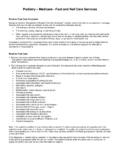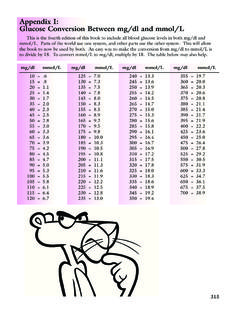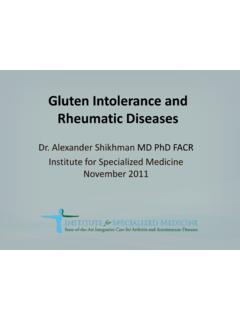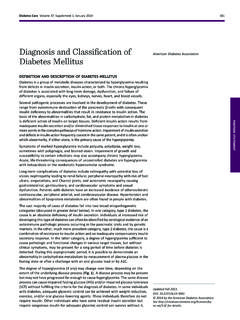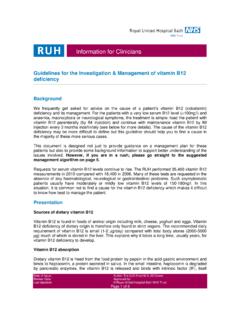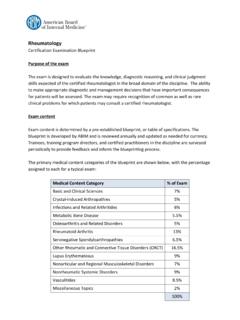Transcription of Chronic Diarrhea Information and Practical …
1 GPDA: Gastroparesis and Dysmotilities Association, Calgary, AB, Canada. Tel: 403-247-3215, E-mail: Chronic Diarrhea . GPDA: Chronic Diarrhea Information and Practical Approaches for Management Chronic Diarrhea is a debilitating condition. Many sufferers are homebound, isolated. If you and your physician have run-out of things to try in order to help control your Diarrhea , then this document may provide some new avenues to explore with your doctor. Our Information handout will take you through a list of possible causes, diagnostic approaches and some very simple remedies that anyone can try but remember try nothing without the full knowledge of your physician. Only your doctor knows your complete health history and your current medications. _____ Causes: A long list of disorders and conditions may lead to Chronic Diarrhea .
2 Sorting through possible causes begins with your family physician. Your doctor will start by taking a careful history. Knowing the characteristics of your stool, the pattern of episodes as well as their timing in relation to eating all help to provide direction for narrowing down the possible causes. A partial list of causes: Characteristics of stools and patterns: Oily, foul, and difficult-to-flush stools are a condition called steatorrhea. Steatorrhea may lead to weight loss, and is found in association with: Pancreatic insufficiency Small bowel bacterial overgrowth (see GPDA s publication on this topic) Prior surgery to remove a portion of the small bowel Chronic infections with parasites, example: giardia (beaver fever) Hemochromatosis* Small-volume Diarrhea may be bloody and may cause painful cramping; it may be accompanied by a sense of urgency as well as sensations of needing to pass further stools but little more comes out.
3 This collection of symptoms, a condition known as tenesmus, is often a result of inflammation within the large bowel. Possible causes: Inflammatory bowel disease such as Crohn s disease or diverticulitis C. difficile, which is often a complication arising from antibiotic use. (The episodes of Diarrhea may be mild to very severe and often associated with a fever.) Other infectious agents (bacteria or parasites) Tumours Prior radiation treatments to the abdomen IBS GPDA: Gastroparesis and Dysmotilities Association, Calgary, AB, Canada. Tel: 403-247-3215, E-mail: Chronic Diarrhea . GPDA: Hyperthyroidism Stomach dumping syndrome**, which may occur within 30 minutes after eating (early dumping) or 1 to 3 hours after a meal (late dumping) Constipation, which leads to overflow Diarrhea .
4 In this case a hard stool may act as a plug, causing a backup of a more liquid stool that finally escapes around the compacted stool zone. Bloating occurs, as well as the ability to feel a hard mass (impacted stool) over your abdomen. Post-gallbladder-removal (Treatment with either cholestyramine or aluminum hydroxide is usually highly effective for controlling post-gallbladder-removal Diarrhea ) Large-volume Diarrhea is usually watery; it carries a greater risk of dehydration and may be associated with weight loss/malnourishment. Possible causes: Non-cancerous tumours; also, in rare cases, carcinoid tumours Post-infectious damage to the small bowel mucosal lining, which commonly leads to lactose intolerance and/or mal-digestion of sugars (fructose, sucrose) Ulcerative colitis Celiac disease (also commonly found in association with Type I diabetes) Cancerous tumours: adenocarcinoma, lymphoma Diabetic neuropathy Whipple disease (very rare) Side effects of many different medications can also cause Diarrhea .
5 Talk to your pharmacist to find out if any over-the-counter drugs, supplements, or prescription medications may be the culprit of your Diarrhea . Caution: Many probiotic (good) bacteria may cause loose stools. _____ * Hemochromatosis > A hereditary disease causing excess absorption of dietary iron. Iron slowly builds up in various tissues within the body. A wide array of puzzling symptoms, one of which is Diarrhea , begins to show up. The hereditary condition is most prevalent in Northern Europeans, especially people from the UK. > The organs most susceptible to iron build-up are The liver, resulting in progressive failure (cirrhosis) The pancreas, resulting in the development of Type II diabetes The heart, with development of rhythm disturbances or failure The joints, resulting in arthritis The skin, which may eventually develop a darker hue from iron deposits > Fatigue, Type II diabetes and sore joints are often the only initial symptoms.
6 > Blood work helps to diagnose the problem with findings of elevated serum liver enzymes and abnormal transferrin saturation. > Many other symptoms related to adrenal insufficiency, Parkinson s-type symptoms, deafness and others may show up over time if the problem goes undiagnosed. GPDA: Gastroparesis and Dysmotilities Association, Calgary, AB, Canada. Tel: 403-247-3215, E-mail: Chronic Diarrhea . GPDA: > Treatments: Once iron is deposited within the organs, it cannot come out; however, low blood-iron levels may be maintained and further iron deposits within body tissues may be prevented by avoiding iron in the diet, and with periodic blood removal or chelation therapy. **Stomach dumping syndrome >A condition in which the stomach empties too rapidly. Dumping syndrome is an abnormal motor disturbance found in the stomach.
7 It is a fairly common problem associated with Type I and Type II diabetes. Oddly, dumping syndrome may present with similar digestive symptoms (nausea, vomiting, abdominal discomfort, and bloating) as are found in a disorder in which the stomach empties too slowly (gastroparesis). Diarrhea is a common feature of dumping syndrome. For more Information on dumping syndrome, please see the GPDA publication titled: Gas, Bloating and Belching . > Treatments: During mealtime, it helps to consume liquids apart from solid foods. Liquids can be drunk half an hour before eating anything solid. Avoidance of simple carbohydrates is recommended as well as eating small meals more frequently throughout the day. Some medications have been found helpful. In a carefully selected group of patients, relief from Diarrhea may be achieved with a drug called acarbose.
8 Acarbose is used as a treatment for Type II diabetics (and can cause Diarrhea as a side effect), but may help non-diabetics who are suffering with Diarrhea from dumping syndrome. _____ Irritable bowel syndrome One of the most common causes of Chronic Diarrhea is irritable bowel syndrome (IBS). Characteristic symptoms of IBS include abdominal cramping and bloating as well as changes in stool consistency: either alternating between Diarrhea and constipation, or predominately at one extreme ( Diarrhea ) or the other (constipation). Approximately 15% of the cases of IBS occur as a consequence of bowel infection (food poisoning, parasitic or viral infections). Many foods, such as coffee, are found to trigger to the symptoms. The diagnosis of IBS is one of exclusion, that is, it is based upon finding nothing amiss with standard medical tests.
9 Tests commonly done (or that should be requested) are Blood work Barium swallow with follow-through Colonoscopy Abdominal ultrasound Stool samples Breath tests (to look for small bowel bacterial overgrowth, and sugar malabsorption) Many people with IBS are able to control their symptoms with diet, stress management and medications. For others, though, IBS can be disabling and increase in severity over time. GPDA: Gastroparesis and Dysmotilities Association, Calgary, AB, Canada. Tel: 403-247-3215, E-mail: Chronic Diarrhea . GPDA: The label or diagnosis of IBS is frustrating for everyone. Since the diagnosis is based upon subjective diagnostic criteria as well as on the absence of evidence of an underlying, organic cause such as blood, pus, scars or ulcers, it tells us very little.
10 Therefore, IBS, in one way or another, is diagnosed based upon symptoms. The treatment for IBS has tended to emphasize a psychological approach, and, in fact, a considerable amount of research money has been spent looking for a correlation between psychological problems and digestive symptoms. Psychological approaches can help as an adjunctive treatment but should not be considered as the only treatment option. Problems arise when some medical professionals, to explain the cause of IBS symptoms, lay the blame on the individual's emotional dynamics. Patients both adults and children are often labelled with psychological, maladaptive behaviors, or their families are labelled as dysfunctional. Some research has shown that patients presenting to a GI specialist's office with IBS symptoms have a higher rate of psychological problems than the general population.







